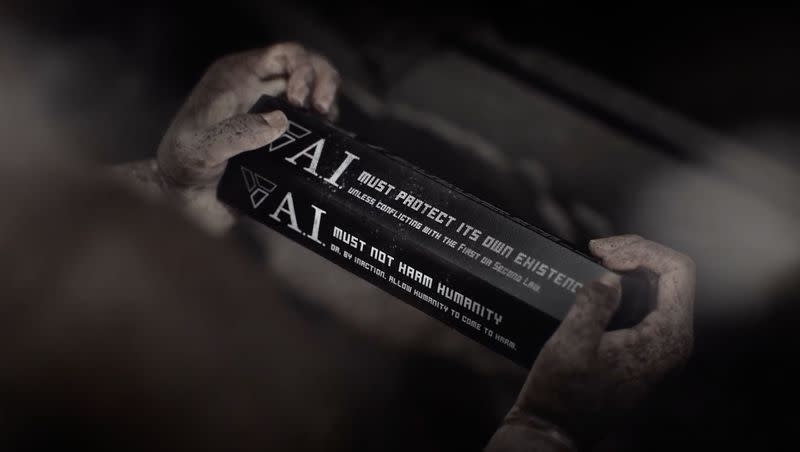A new AI film festival is debuting in Utah, and its timing couldn’t be better

A new film festival focusing on the good, the bad and the ugly of emerging artificial intelligence tools was originally set to debut in 2021, but ongoing COVID-19 restrictions at the time put the effort on hold.
Now, the AI International Film Festival is set to raise the curtain on a slate of some 60 films from around the world from creators who have either focused on exploring the societal impacts of artificial intelligence or employed artificial intelligence tools to produce their projects.
The event, scheduled for May 12-14, is poised to ride a tidal wave of interest, controversy and commentary that’s followed recent advancements in artificial intelligence tools like inquiry driven natural language processors ChatGPT and Bard and image generating engines that include DALL-E, Jasper and others.
Related
Google playing catchup with clever ChatGPT, releases its ‘Bard’ chatbot
Chess playing bot Mittens the Cat has the snark, and the game, to leave you in shreds
AI Film Festival founder Bert Holland said the competitive festival received almost 200 submissions from filmmakers in some 30 countries and included work ranging from animated shorts to full-length features. Documentary explorations, comedic turns and tales of bleak futures wrought by AI systems run amok all figure into the mix.
Holland said the festival is aiming to expand the conversation about, and understanding of, the current and future implications of fast-evolving artificial intelligence tools.
“AI has been in development for years, and we’ve just witnessed a major advancement,” Holland said. “There’s a growing concern that general public and students need to know more.
“This technology will be the driver of a lot of changes the world is going to be going through, and we need to be prepared for them.”
Holland said the festival also includes a contest open to Utah high school and college students, offering over $1,000 in prize money and a screening at the AI International Film Festival awards ceremony.
Student entrants can create and produce 1- to 5-minute films of any genre using ChatGPT, AI gaming technology or both. According to festival organizers, the entries will be judged by international filmmakers, festival staff and faculty in partnership with local universities, colleges and educational institutions. The submission deadline for student films is May 10.
Holland said screenings for about 40 of the festival films will take place on May 12-14 at Metropolitan Redstone Cinemas in Park City, and there will also be virtual options that will include an expanded slate of festival content.
A sampling of films selected for screening at the festival
“Red Gaia”: A 13-minute narrative short film in English, Hebrew Sanskrit and Tibetan by Udesh Chetty (USA).
Alone on the dying red planet, among the ruins of human civilization, one last android desperately guards the last essences of life.
In her pursuit for meaning, she finds her own soul hanging in the balance. The mesmerizing voice of the android is Natasha Loring.
“Red Gaia” is a tone-poem meditation on life, death and rebirth, destruction and creation, and the cycles of existence, drawing inspiration from:
The Bhagavad Gita.
Dante’s “Purgatorio.”
The Kabballah.
The Tibetan Bardol Thodol.
As well as the legendary science fiction writer Isaac Asimov.
“Honey, I’m Home”: A 24-minute narrative short film in Russian by Den Zarubin (Russia).
“Honey, I’m Home” is a gorgeous film-noir, exploring the tension between a killer and the victim, between AI assistant, customer service and client, and between life and death.
“The idea of the film arose at the moment of making a decision — to order sushi by phone,” Zarubin said in an artist’s statement. “The comic idea has transformed into a satirical genre story, where we can assume a near future in which artificial intelligence will be able to help by consulting human clients and in rather delicate moments.”
“Utopia”: A 44-minute narrative documentary in English by Angela Andersen (Germany).
In no time, Big Tech has created an amazing new world. Welcomed by many, even when it came upon us all with uncalculated risks.
But the tides are changing. A realization that unwarranted consequences of these convenient tools, thrills and distractions might need oversight is gaining speed and muscle.
In this context, “Utopia” focuses on Mark Zuckerberg’s Metaverse and Elon Musk’s vision to pair many human brains with implanted computer chips while also building an “escape hatch” to other planets. Just in case humanity will fail on Earth.
This film invites its viewers to be involved in a discussion on where humanity is heading.
Festival organizers said virtual and in-person attendees will be encouraged to rate the films and vote for Audience Choice Awards in several categories.
In-person attendees can participate in live discussions with international directors, actors and crew at select screenings. A panel discussion on May 11, featuring industry professionals, international filmmakers and academic experts, will explore how artificial intelligence tools are poised to reshape the world of cinema.
To learn more about the AI International Film Festival, including how to purchase tickets and find a list of festival films, visit aifilmfest.org.

